
Over the last few months, a common question has been appearing in my email box:
What if Exercise is Not Enough for Your Knee Injury?
I have been sitting on my hands, thinking of a reply, and it finally hit me:
You Break the Knee Injury Rules
All of this came subtly:
- clients asking what else they can do for their knee injury
- customers that ordered Knee Injury Solution
- registrants from past Exercise Rehabilitation of the Knee courses
- a family member asking for some help
I have purchased your knee injury solution product and many more.
They are great.
I have several clients though (I’m a Personal Trainer) that have knee injuries that are not going to go away.
For instance, the lady who has no meniscus left and damaged cartlidge and tendons throughout her knee but is told she’s too young for a knee replacement.
She wants to continue training, and she does, but she has no or very little stability in both knees and cannot perform any degree of squat or lunge without pain.
We therefore avoid these exercises, but there’s only so many hip bridges and rom deadlifts we can do.
We also do a bit of band work, but must be very careful about which plane we move in. She must sit for most things, even upper body work as some days just a bit of upper body movement is too much for her unstable knees.
Any ideas how I can further approach this?
On good days we can do boxing, battling ropes etc for cardio, cycling is no good-too much pain and definitely no running or even walking is out some days.
I have 3 clients in this same situation all due to being obese for years-all have reduced to healthy weight now and have endured knee operations that haven’t helped.
JB
This is the Knee Injury Solution program that JB was talking about:
Let me go through a few things that she can do.
I can easily ramble off stuff that I know would help, but I wanted to dig in the research and see what it had to say about knee injuries and what she and you can do.
#1 – Losing Some Weight Can Eliminate the Need for a Knee Replacement
Let’s start here.
This is a huge statement.
We often do not want to start here with our clients, but it is probably the most significant factor, and if this is not dealt with, everything else won’t matter much.
Much of the research refers to osteoarthritis (OA) of the knee and hip and what can be done to help each manage and recover from knee injuries. Let’s look at some research that came out last month from Anandacoomarasamy (WoW, the last name.).
It is well documented in the research that weight loss can reduce symptoms in the knee due to OA. This should be enough to motivate people to lose some weight.
Researchers wanted to see the effective weight loss had on knee cartilage structure in the pager. They found that a 7% weight loss positively affected the medial femoral compartment, not the lateral compartment. The study had 111 obese adults with a mean age of 51.7, and 32% had clinical knee OA.
In the paper, they made this powerful statement :
“Weight loss is associated with improvements in the quality (increased proteoglycan content) and quantity (reduced cartilage thickness losses) of medial articular cartilage.”
They stated that weight loss could be enough to “reduce the need for total joint replacements.” A very, very, very powerful statement.
To sum it up, your client might have to search out the best way for them to lose some weight. This might mean changing their exercise routine, having you clean out their kitchen, making a lifestyle change, or medical weight loss.
This probably should be the first and most important step for one’s knee injury.
#2 – Stop Making Upright Lunges
I feel this statement will make the fitness technique police go crazy, and a good chance several fitness educators will complain to the association that I am telling people to break the rules regarding the lunge.
The biomechanics of it is simple, and the research backs it up.
Move from an upright lunge position to a trunk forward lunge position.
This will decrease the stress on the knee and activate the gluteus Maximus, which will make the exercise easier to do and help work the gluteus Maximus, which most people with knee injuries need to work on.
Not sure what else to say other than try it. Make a lunge that the fitness gods have approved. Then make a lunge with your trunk forward.
- How does it feel on your knee?
- How do the muscles in your knee feel?
- How does your seat feel when you do it?
Okay, I am moving on.
#3 – Take Some Good Pills
I am not a big pill-popping fan.
After being sick this week and feeling how quickly I started feeling better after taking the right pills, my view changed.
I might dig into the research again to see what it says about this. The evidence is good regarding glucosamine sulfate, and chondroitin sulfate interferes with OA progression in the knee and the hip. Dose, frequency, brand, form, etc., are things to consider.
If you’ve got a knee injury, look into GS and CS. Before I move on, pain may not be a good thing to look at when it relates to this stuff working.
Let me explain:
“This trial showed that glucosamine hydrochloride and chondroitin sulfate alone or in combination did not reduce pain effectively in the overall group of knee OA patients. However, exploratory analyses suggest that the combination of glucosamine hydrochloride and chondroitin sulfate may be effective in the subgroup of patients with moderate-to-severe knee pain.”
Glucosamine sulfate and chondroitin sulfate have minor to moderate effects on symptoms (pain being one of them) but may interfere with osteoarthritis (OA) progression.
#4 – What You Are Eating is Making Your Knee Injury Worse
If we look at weight loss being necessary for a knee injury, most often, the cause of weight gain is diet. Plus, if there are specific things we can eat that can help our knee injury, then there have to be particular things that we are eating now that can worsen our knee injury.
The first person to highlight this to me was Dr. Peter Osbourne.
Above was an interview I did with him at a conference that we were at. When he told me that, it got me thinking a lot about how what we eat can slow down our knee injury recovery.
I will be seeing him again next month, so I will work on getting another interview for you. Dr. Peter Osbourne has a great article on “Foods that Contain Gluten,” which is eye-opening.
The Last Word
I hope you enjoyed this article and got as much out of it as I put it together.
I think I have focused so much on exercise helping injuries and have not spent enough time looking at other things that will help with injury recovery. Furthermore, I constantly challenge what I am doing, learn new things, test things out, and share what has worked.
If you have any feedback or insight, please let me know.
Rick Kaselj, MS







